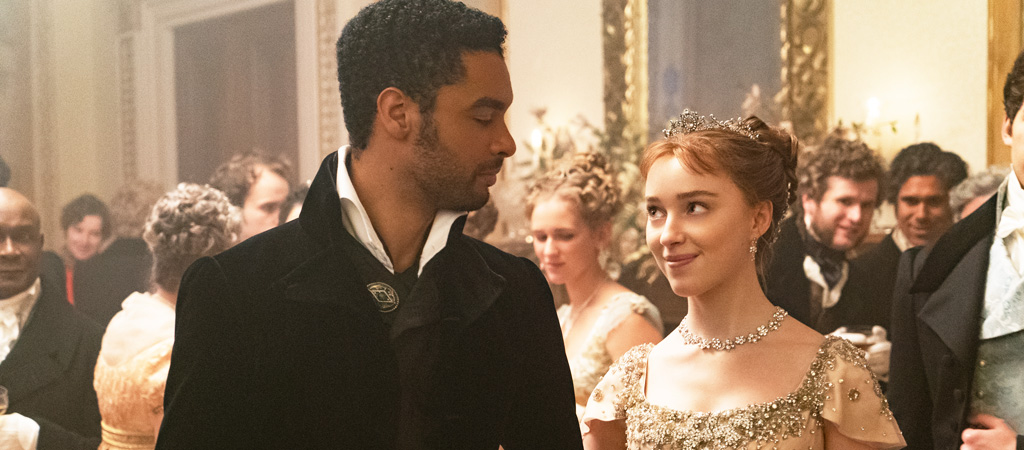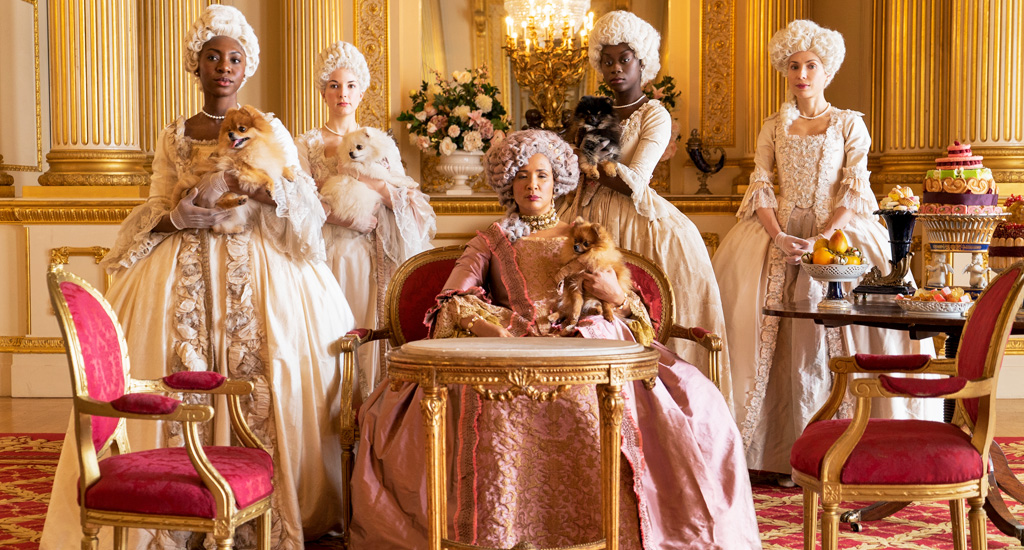
I don’t need to remind you of the dumpster fire we’re currently enduring in reality, so it’s enough to stress that we all need to freaking unwind. We all do that in different ways when it comes to picking TV shows, but Netflix knows that, every now and then, even the most sophisticated people among us can appreciate a guilty pleasure of a story. Sometimes these trashy, enthusiastically embraced shows actually end up being good, but not always, although it certainly helps if there’s some tangible value. In the case of Shondaland’s Bridgerton, there’s definitely that value. You’ve got a guilty pleasure with a scandalous, wildly romantic romp through 19th-Century Regency England, and you can indulge in this hot mess while witnessing some subversive feminism.
This show does not go heavy-handed with meaningful moments, but it’s sure nice to see some substance within all the fizzy and buzzy aspects of this series. In other words, this is not an Emily In Paris situation. Bridgerton might be pure escapism that wraps itself in miles of shimmering, lavish fabric, but it also contains the same measure of solid messaging. Sex positivity abounds and does so from the female perspective. It’s an unexpected approach for the story’s scandal-ridden marriage market, and while some outcomes are predictable, there’s so much going on here that predictable doesn’t even matter. It’s a jam-packed show without feeling overstuffed, and there’s not an ounce of fat within eight episodes. And this show still manages to be a sultry, sexy confection.
With that said, this is Shonda Rhimes’ first Netflix show, and it’s part of a nine-figure deal to deliver what she’s known for delivering. And given that she’s the creator of several shows, including Grey’s Anatomy, Scandal, and How To Get Away With Murder, anyone who knows her work will have a good idea of what to anticipate, even though Bridgerton is Rhimes’ first period drama. As far as expectations go, what you need to know is this:
– Bridgerton is not a show that will appeal to everyone. If I was to make a comparison to another recent Netflix series, The Queen’s Gambit carries far more universal appeal. You didn’t need to know anything about chess or even be at all interested in the game to enjoy the underdog tale of Beth Harmon and how Anya Taylor-Joy’s the master of a steely stare. A lot of people who watched that show suddenly wanted to play chess. In contrast, Bridgerton won’t make you want to do anything, other than sit back and enjoy the scandal. Here, the audience is far more specific, and you’ll need to (at least slightly) enjoy the romance genre to give this show a fair shot.

– The challenge of achieving cast diversity and inclusivity within 19th Century, high-society England is huge. While Rhimes and her creator Chris Van Dusen adapted the series from books by Julia Quinn, they drew upon nuggets of history. They included the figure of Queen Charlotte (Golda Rosheuvel), who’s thought to be the first biracial royal in England. The show operates under the assumption that Charlotte’s heritage was not only groundbreaking but led to a diverse aristocracy, where English dukes and ladies were often people of color. Likewise, the feminist leanings of characters don’t seem out of place, even in a historical period where the value of a female prior to marriage lies solely within her virginity and the size of her dowry. It’s a very careful balance to achieve, but the writers pulled it off.
– There’s a lot of Gossip Girl flavor here. Julie Andrews plays a narrator who’s also an alias-clad, fresh-on-the-scene gossip columnist known as Lady Whistledown. She’s tearing high society’s little world apart, including families who are aghast at the mere thought of acquiring a bad look during debutante season. She’s key to ruining the chances of our protagonist, Daphne (Phoebe Dynover, somehow portraying both naive and self-possessed vibes), the eldest Bridgerton daughter, who the queen declared to be a “flawless” marriage candidate. Thanks to a set of circumstances including Whistledown, Daphne’s in a precarious situation. In order to salvage her marriage chances, she enters into a deal with an unrepentant bachelor, the Duke of Hastings (Regé-Jean Page), to meet their mutual goals while the vultures descend. They agree not to love each other, but yup, you know how that goes.
– All of this sounds very predictable, and I get it. However, the enjoyment factor associated with Bridgerton is not where it arrives but how it gets there. There are so many ups and downs to Daphne and the Duke’s ordeals together that one will be constantly entertained. There are tons and tons of couplings, which all arrive with motives and mislaid intentions and fallout, and the vicarious sense of escapism here is almost as seductive as the sex scenes (which all actually have a place within the story, so they are lurid, yes, but not gratuitous). Likewise, one might believe there’s a predictable way in which female characters challenge the patriarchal structures that confine them. That, too, does not happen as anticipated. It’s very fun to watch the feminist parts of this show unfurl.
– Speaking of fun, this show’s going to be one hell of a phenomenon on social media. With The Witcher being pushed back a few months into 2021, Bridgerton will shoulder a lot of fandom over the coming weeks. God help Regé-Jean Page because Twitter’s thirst for his character will be insurmountable over the holidays. He and Phoebe Dynover are both fantastic in their roles, but given how this show’s written and how gender dynamics play out, one had better hope that Page braced himself to be an object of desire. He can likely handle it, and it’s actually quite refreshing to know that the swooning will be due to a character who’s actually good-hearted underneath his rakish exterior (instead of, say, Penn Badgley’s You stalker).
Ultimately, Bridgerton will be, as the younger adults say these days, a very non-problematic fave. It’s diverse and inclusive and intersectional and all of those progressive descriptors, but it’s also important to note that this show never forgets that, first and foremost, it’s entertainment. And for those who tune in, the show will be an irresistible binge to help us endure this very problematic holiday season.
Netflix’s ‘Bridgerton’ will begin streaming on December 25.
